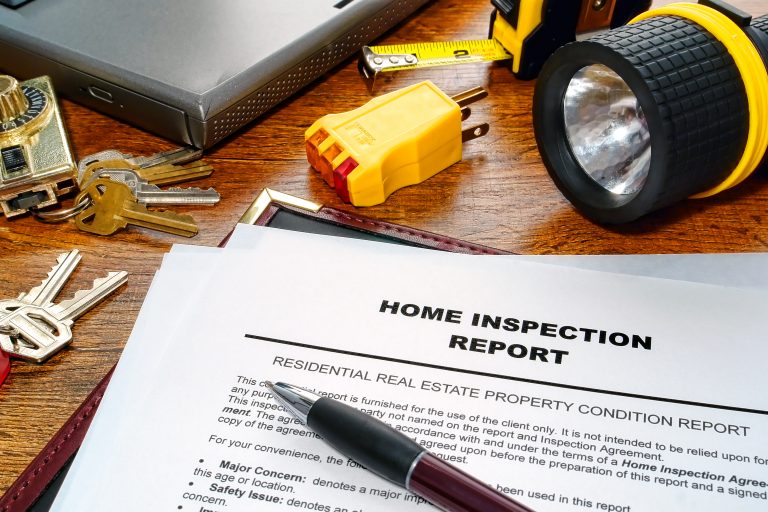A home inspection is an essential step in the home buying process. When making such a significant financial decision, it is crucial to understand the property’s current state. The inspection will notify you of any problems or necessary repairs before you finalize the purchase.
What is a Home Inspection
A home inspection is a visual, noninvasive assessment of a home’s physical structure and condition performed by a professional inspector. The inspector will walk through and around the home’s interior and exterior and note the current state.
A home inspection aims to shed light on any potential structural or mechanical issues in the home, so the buyer has the opportunity to negotiate the cost and/or repairs with the seller before the mortgage closing
How does a Home Inspection Differ from a Home Appraisal?
A home inspection is simply an assessment of the home’s current physical condition, unrelated to the surrounding houses. An appraisal is an assessment and valuation of the property in comparison to other homes in the neighborhood.
What is the Cost of a Home Inspection?
The home inspection will typically cost between $300-600. The cost may vary depending on the home’s size, location, and age.
- Who Pays for the Inspection?
Most likely, the buyer (borrower) will pay for the home inspection. It is common to pay for the inspection right after it was completed rather than paying for it at the mortgage closing.
How to Find a Home Inspector
It is best to ask your real estate agent or mortgage advisor for a home inspector referral. You may also ask your friends, family, or colleagues who have gone through the home buying process before!
What do Home Inspectors Look for? Home Inspection Checklist:
The home inspector will examine the following factors during the walkthrough and thorough evaluation of the home:
- Heating and electrical systems
- Condition of the roof
- Ceilings (check for cracks, warping, or water damage)
- Plumbing
- Floors (check for cracks, loose floorboards, water damage)
- Windows and doors
- Structure of the home and foundation
- Walls
- Insulation
- Attic
- Basement
- Smoke and carbon monoxide detectors
- Stairways
- Chimney condition (if applicable)
Home Inspection Tips for First-Time Buyers & Sellers
Tips for Buyers
- Ask your trusted network for an inspector referral
Ask around for an inspector referral to make sure you hire someone trustworthy, experienced, and reliable.
- Don’t be afraid to negotiate
If the inspector finds a significant problem with the home, such as mold, you can negotiate the cost and terms of the sale with the seller. Maybe the seller will cover the repair cost, or they will agree on a lower purchase price.
- Have an open line of communication with your inspector, real estate agent, and mortgage specialist
If you cannot attend your home inspection, you can ask the inspector to review the findings with you. From there, you can discuss the results and next steps with your real estate agent and mortgage specialist!
Tips for Sellers
- Have an understanding of what inspectors are looking for
An excellent way to prepare for the upcoming inspection is to familiarize yourself with the home inspection checklist. You may notice an item on the list you recently had some problems with, such as a leak in the basement. That way, you can try to schedule some necessary repairs before the scheduled inspection.
- Tidy up your home
General home aesthetics, such as décor and paint, are not considered during the home inspection. However, it is best to tidy up your home before the inspector comes to free up space and eliminate any potential distractions.
How Long Does a Home Inspection Take?
The home inspector needs to take their time to make sure nothing is overlooked and comes as a surprise after you purchase the home. Thus, the inspection may take between 2-4 hours. The timing may vary depending on the home’s size and age.
The Home Inspection Report: How to Read it
After the inspection, you will receive a report that outlines the property’s features and notes any minor or major issues that may need further attention. Some recommended repairs may be as minor as repairing a leaky faucet, while others may require more work, such as repairing a decaying roof.
The inspection will include photos, notes, recommendations, and more. Once you review all the findings, you may decide if you want to negotiate any terms or repairs with the seller.
- What is an inspection contingency?
An inspection contingency is a clause on the purchase contract stating that the buyer may back out of the deal and move on if the seller refuses to make the necessary repairs depending on the inspection results.
Summary of the Home Inspection Process
A home inspection not only brings light to issues unknown to the buyer but also possibly to the seller. The inspection is a critical component of the buying process and will help ensure that you are in the best possible position when buying your new home!

